
Knee Replacement in Hosakerehalli, Bangalore
Knee pain can limit mobility and affect daily life. Whether due to arthritis, injury, or wear and tear, chronic knee issues can make walking, climbing stairs, or even standing uncomfortable. Knee replacement surgery is an effective solution that helps restore movement, reduce pain, and improve the quality of life.
Dr. Nikil S Paramesh, an eminent orthopedic surgeon in Hosakerehalli, Bangalore, states, “Modern knee replacement techniques offer significant pain relief and improved mobility. A well-planned surgery and proper rehabilitation can help patients regain an active lifestyle.”
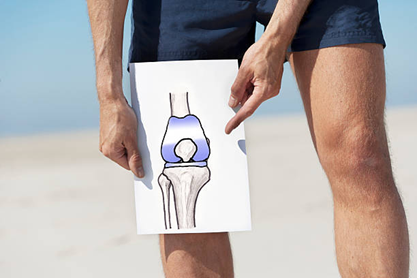
With over 10 years of experience treating knee conditions, Dr. Paramesh is renowned for his proficiency in knee replacement in Hosakerehalli, Bangalore. His approach combines advanced surgical techniques with patient-centric treatment plans to achieve optimal results.
What is Knee Replacement Surgery?
Knee replacement or knee arthroplasty is a surgical procedure that replaces a damaged knee joint with an artificial implant. It is suggested for patients with severe arthritis, injuries, or degenerative joint diseases that cause chronic pain and limited movement. The goal of the surgery is to relieve pain, restore mobility, and improve overall joint function.
There are two main types of knee replacement surgery:
What is Knee Replacement Surgery?
Total knee replacement surgery procedure involves replacing the femoral (thigh bone) and tibial (shin bone) surfaces of the knee joint with an artificial implant. It is recommended for patients with severe arthritis or joint damage affecting the entire knee.
🔹 Key Features:
✔ Removes and replaces the entire knee joint
✔ Best for advanced arthritis and chronic knee pain
✔ High success rate and long-lasting results
✔ Recovery time: 6-12 weeks
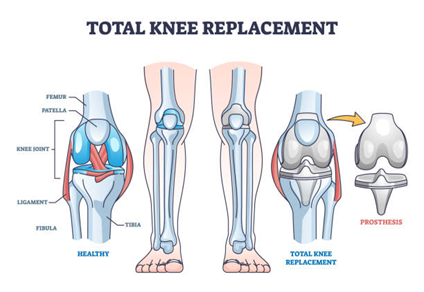
Partial Knee Replacement (PKR)
Partial knee replacement, or unicompartmental knee replacement, is performed when only one part of the knee joint is damaged. The procedure preserves healthy bone and tissue, making it less invasive than total knee replacement.
🔹 Key Features:
✔ Replaces only the damaged portion of the knee
✔ Suitable for early-stage arthritis or localized damage
✔ Faster recovery and minimal bone removal
✔ Recovery time: 4-6 weeks
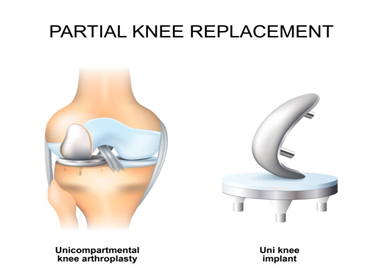
Reasons for Knee Replacement
Severe Osteoarthritis: It is the most common reason for knee replacement, resulting in joint stiffness and pain.
Rheumatoid Arthritis: It is an autoimmune condition that leads to inflammation and damage in the joints.
Post-Traumatic Arthritis: Injury-related damage that affects knee function.
Knee Deformities: Conditions like bow-legged or knock-kneed alignment can lead to knee replacement.
Limited Mobility: Inability to perform daily activities due to knee stiffness or pain.
Failed Previous Surgeries: When previous knee procedures don’t provide relief, replacement may be needed.
Steps Involved in Knee Replacement Procedure
Pre-Surgical Evaluation: Nikil S Paramesh, a competent orthopedic doctor in Hosakerehalli, Bangalore, conducts a thorough medical history review, physical examination, and imaging tests (X-rays, MRI) to assess the knee condition.
Anesthesia Administration: The patient receives either general or spinal anesthesia for a pain-free procedure.
Surgical Incision: The surgeon creates a small incision (typically 6-10 inches) over the knee to access the joint.
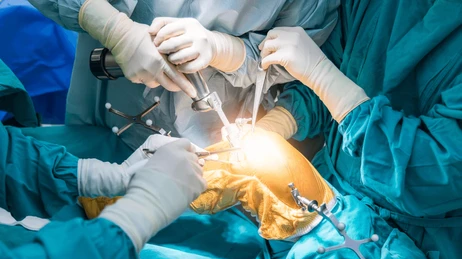
Removal of Damaged Tissue: The surgeon removes the worn-out or damaged cartilage and bone from the knee joint.
Bone Reshaping & Preparation: The remaining bone surfaces are reshaped to ensure a precise fit for the artificial implant.
Implant Placement: The surgeon securely places the prosthetic joint made of metal and plastic using specialized bone cement or press-fit techniques.
Patella Resurfacing (if required): The surgeon may resurface the underside of the kneecap with a plastic implant for smooth joint movement.
Proper Alignment & Balancing: The surgeon ensures the implant is correctly positioned to restore natural knee function and prevent instability.
Closure of Incision: The incision is carefully stitched or stapled, and a sterile dressing is applied to prevent infection.
Post-Surgical Monitoring: The patient is closely monitored in the recovery room for vital signs, pain management, and immediate postoperative care.
Physical Therapy Initiation: Rehabilitation begins within 24 hours post-surgery, including light exercises to improve knee mobility.
Hospital Discharge & Home Care: Most patients are discharged within 2-3 days with guidelines on pain management, movement, and wound care.
Follow-Up Appointments: Regular check-ups with the surgeon ensure proper healing, track progress, and adjust the rehabilitation plan if needed.
Long-Term Recovery & Strengthening: Over the next 6-12 weeks, continued physical therapy and strengthening exercises help restore full mobility and knee function.
Benefits of Total Knee Replacement
Pain Relief: Eliminates chronic knee pain and improves movement.
Improved Mobility: Helps restore normal walking and daily activities.
Long-Lasting Results: Modern implants last 15–20 years or more.
Better Quality of Life: Allows patients to enjoy an active lifestyle again.
Minimal Recovery Time: Advanced techniques ensure quicker rehabilitation.
Higher Success Rate: Over 90% of patients experience significant improvement.
Why Choose Dr. Nikil S Paramesh for Knee Replacement in Hosakerehalli, Bangalore?
Expertise & Experience
With over a decade of experience, Dr. Paramesh specializes in knee replacement surgery in Hosakerehalli, offering advanced, personalized care.
Advanced Surgical Techniques
He employs the latest minimally invasive techniques, promoting faster recovery, reduced pain, and minimal scarring.
Proven Success
Dr. Nikil Paramesh has performed many knee replacements, helping patients regain mobility and live pain-free lives.
Patient-Centred Approach
Each treatment plan is tailored to the patient’s condition, ensuring personalized care, comprehensive pre-surgical counselling, and post-operative rehabilitation.
State-of-the-Art Medical Facility
The procedure is conducted in a well-equipped facility with modern technology to ensure high precision and improved surgical outcomes.
Expertise in Complex & Revision Knee Replacements
For patients requiring revision surgery due to previous unsuccessful procedures, he offers specialized expertise to restore function and mobility.
Recovery After Knee Replacement
Hospital Stay: Most patients stay for 2–3 days post-surgery.
Physical Therapy: Begins within 24 hours to restore knee movement.
Pain Management: Medications help manage post-surgery discomfort.
Gradual Return to Activity: Walking with support within a few days.
Full Recovery Timeline: Most patients regain normal function within 6–12 weeks.
Long-Term Care: Regular follow-ups ensure successful recovery.
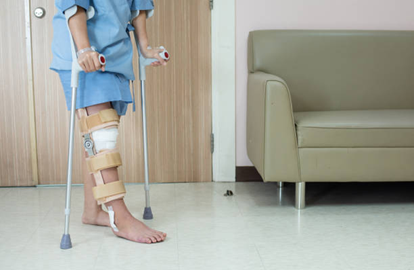
Wondering If You Need Orthopedic Care?
If joint pain, back issues, or sports injuries are affecting your quality of life, consulting an orthopedic specialist is the first step toward recovery. Schedule a consultation today.
Email Address
nikilparamesh@gmail.com
Call Me
+91 9900373331
Sri Vinayaka Ortho Care Center
30, 3rd Main Rd, AGS Layout, Hosakerehalli, Bengaluru, Karnataka 560061
Still have questions? Here are some answers to common concerns about orthopedic care.
Frequently Asked Questions
1. How do I know if I need knee replacement surgery?
2. What is the success rate of total knee replacement surgery?
3. What is the recovery time after knee replacement?
4. What are the risks associated with knee replacement surgery?
5. Can both knees be replaced at the same time?
Disclaimer: This page is for informational purposes and not for promotional use.
